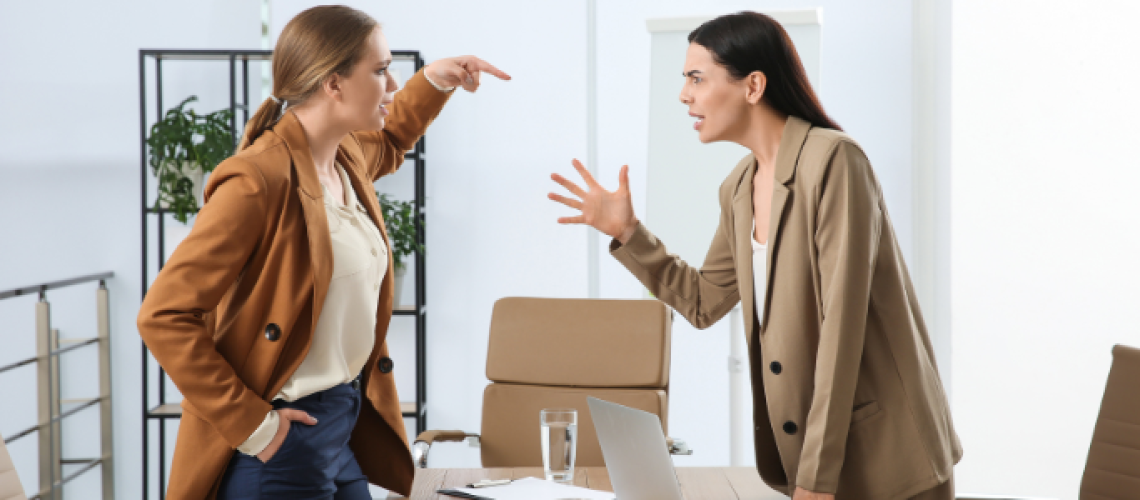In a disconnected world, feeling our emotions or, more specifically, emotional expression has become a growing topic across corporate. It’s why we see so much training and courses continuing to be offered around emotional intelligence and the like. And it’s no surprise! Leaders who are disconnected from their emotions cannot effectively support others in understanding theirs.
Self-expression, which is a big part of showing up authentically, must be encouraged, not suppressed, for a workplace to thrive. Empathy, as another example, begins with learning to connect to your own emotions first before you can effectively connect to another.
No – not to provide therapy, but to connect, to hear, to foster psychological safety so that others, especially women, can express themselves in all their glory. Not just when it’s polite to do so.
A workforce that doesn’t feel safe to express themselves, let alone the emotions that make us human, is a workforce that is suppressed and works in a fear-based culture.
In a new world? This simply won’t cut it.
The world has been through enough. Women are no longer interested in hiding when they are inspired to express themselves. Especially if they are changemakers. And a new generation will laugh at your corporate façade and demand to be treated as whole human beings, not robots without a heart.
So, when we talk about emotions in the workplace, we’re talking about the spectrum of emotions that many of us all experience in our day to day. Over the years, the workplace has become an island where any kind of emotional expression is discouraged, and only in recent times have we begun to have conversations on the value of expressing our emotions at work, let alone our passions.
While all of us can relate to suppressing how we really feel at work, women have been slapped with labels such as emotional, too sensitive or angry for years.
Being the brunt of these labels and wildly misunderstood when they don’t show up the way their leaders expect them to or the same as their peers and colleagues has held them back and minimized their leadership potential.
There is no diversity or uniqueness in sameness.
A few labels that may be familiar to you:
Introversion is confused with being “too quiet”
Highly empathic is confused for being “too sensitive”
Creative is confused for being “different”
A healthy expression of passion and assertiveness is confused with being “angry,” “too emotional,” or even “aggressive.”
The labels are exhausting and tiresome. To have to explain and, at times, feel like women must defend their self-expression, for fear of rocking the boat, being misunderstood, or being labelled for something they’re not.
The choice becomes far too easy, yet almost necessary for self-preservation.
It’s no wonder women hold back and aren’t supported in sharing their passions or creativity, let alone simply expressing how they feel. And as a result, their leadership and self-expression are watered down, which doesn’t allow them to fully tap into their full potential.
Creativity, passionate pursuits, or even a unique approach to leadership invite us to bring our hearts and soul into them.
Why? Because most styles of leadership that have been around for years were designed to create order, control and manage productivity. There’s no such thing as including your heart or talking about emotions. Authenticity was rarely encouraged, and we have a whole generation that traded theirs for conformity.
Times have most definitely changed. Anything outside of the norm is considered creative or different, and creativity comes from the imagination and taps into the heart, not the mind.
When you’re not living within your hearts and instead masking them so that they’re more closed than open, it compromises the quality of your leadership.
If you asked for data or research to support this, I’d tell you to just look around you. Who are the leaders you can identify that are fully and authentically expressed? True to who they are, connected, engaged and using their heart in leadership?
Better yet, you may be a woman that feels like this. Unable to truly express how you feel or show passion for the work you do. I know there are millions of you out there because some of you I’ve coached. And I’ve been there too.
The reward for leaning IN to your emotions has a ripple effect. One worth making.
- More authentic to who you are, which makes your leadership more authentic
- Leading by example to show others it’s safe and admirable to express yourself
- Creative and passionate pursuits come to LIFE because you’re choosing they’re worth doing so instead of hiding them away because of fear
- The correct environments and people DO recognize and appreciate you for who you are; no more holding back or pretending
- Confidence increases which garner the confidence others have in your leadership
- Positively impact your organization – your leadership potential expands, inspired to take more risks, employees are more effectively supported and more
The women I coach want to keep the parts of them that make them powerful women – their nurturing quality, sensitivity, compassion, heart wisdom, and intuitive insight, to name a few. In some cases, they want to feel confident in applying a more passionate and creative approach to their leadership as needed without feeling the fear of any negative consequence.
They’re not interested in conforming to someone else’s recipe of what success or leadership looks like, including their organization and more than anything, want it to be aligned with who they are.
They want to be recognized for their strengths and great work, not criticized or judged for it.
They want to be appreciated for who they are, not questioned if they have what it takes and have to perform for their positions or organizations to prove something they don’t need to.
They want to be visible for ALL the right reasons.
They want equality. Period.
They want to be supported and championed, not pitied.
They want to belong, and they want to be included.
That means it will likely be different than what traditional leadership and corporate environments celebrate and accept and guess what? That’s ok.
If you’re a woman resonating with this and saying, “Yes! Where do I start?”
Here are a few recommendations:
Aligned success for you needs to include being radically honest with the parts of you you’re holding back while getting clear on what your unique leadership style is. And using courage every day to lead as such.
Understand what you struggle with and are committed to overcoming.
- Is it using your voice in the boardroom? Is it asking for what you need?
- Is it struggling with saying NO because you want to be liked while secretly battling burnout?
- Is it setting clear boundaries because you want to appear as reliable or dependable at the expense of your own needs?
- Is it showcasing your leadership in a way that gets you noticed and recognized?
- Is it being more authentic in ALL areas of life, especially at work?
Practice taking steps daily in allowing yourself to be YOU.
- What’s one thing you can commit to doing that allows you to be more fully YOU?
It may sound silly, but I promise you, it’s these practical steps that yield meaningful results.
- Is it sharing your unique perspective when you’re more inclined to hold back?
- Is it preparing to have THAT conversation with your boss you’ve been avoiding?
- Is it presenting a creative idea and going outside of the corporate lines?
- Is it deciding to find a better work environment and people that value you?
The act of coming back to who you are always begins with the smallest of steps that are on the path of authenticity. Leveraging the array of your emotions to express yourself, including your passions, is part of what makes you human. They don’t leave you just because you’re at work. Embrace them and use them to elevate and enhance your leadership.
The best part – you don’t have to do this alone!
Hire a coach. The work to become your best takes a village. Nurture and build a network of like-minded individuals who inspire, uplift and value you. Choose wisely! Connect with mentors who have been where you’re headed. This may mean looking outside your industry and outside your comfort zone.
If you’re not a woman yet struggling with sharing your passions and emotions at work, these recommendations will still prove useful.
Making room for emotions in the workplace, let alone in leadership, brings more balance to what makes us ALL human. It creates cultures worth working in and creates environments where people want to come to work. It’s not just good for some of us; it’s better for all of us.
Do you allow yourself to show up expressed at work, or do you hold back? What would need to change for you to feel safe to express yourself in the workplace? Let me know in the comments!
With emotion, passion and love
Lisa





